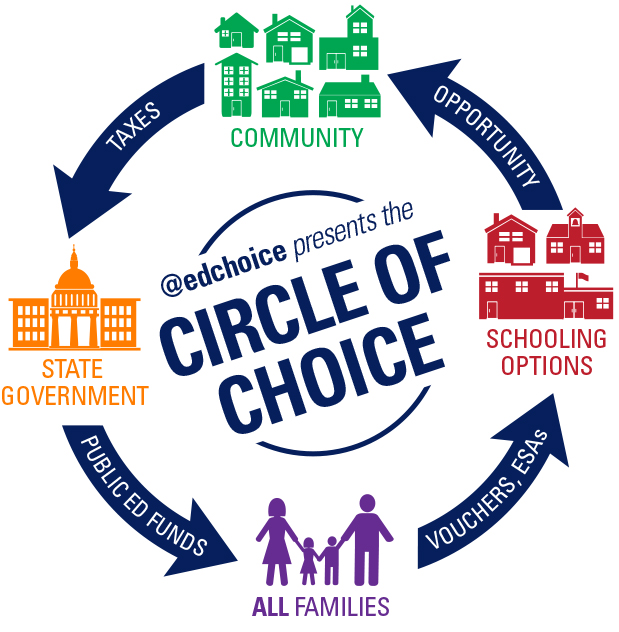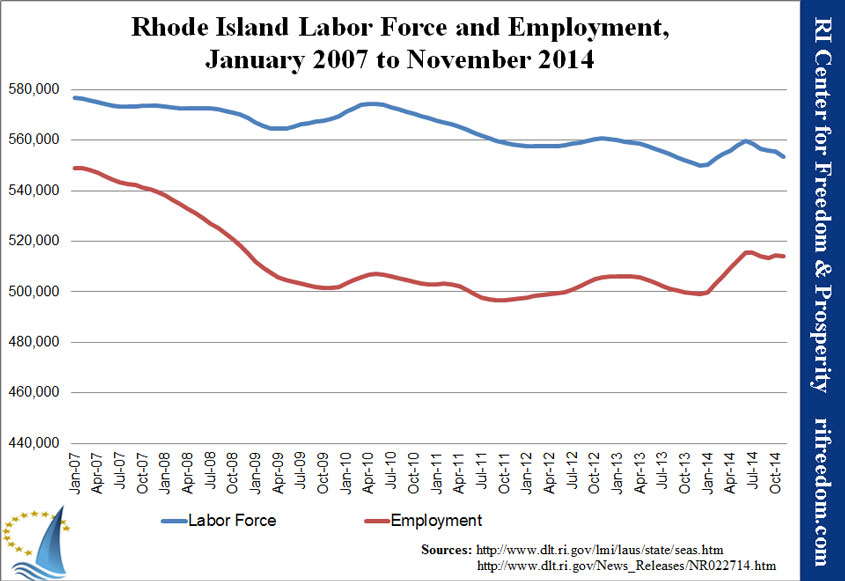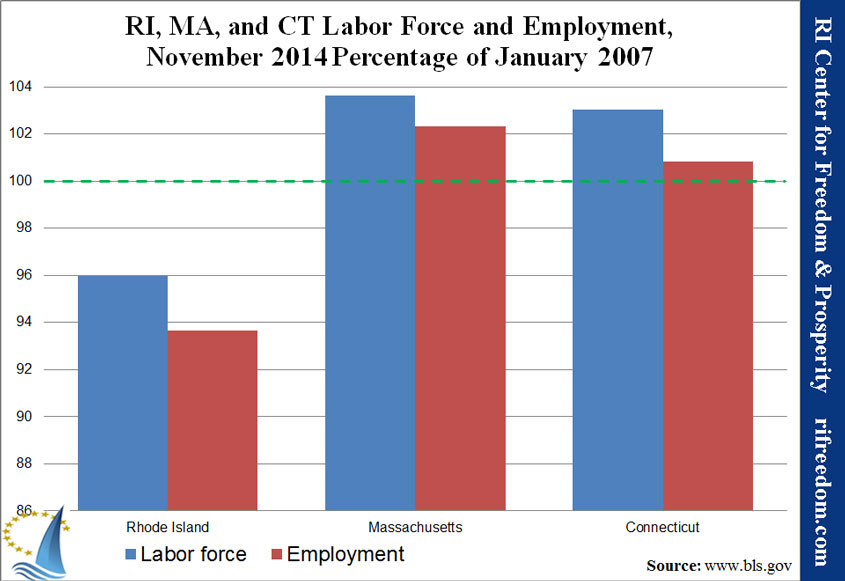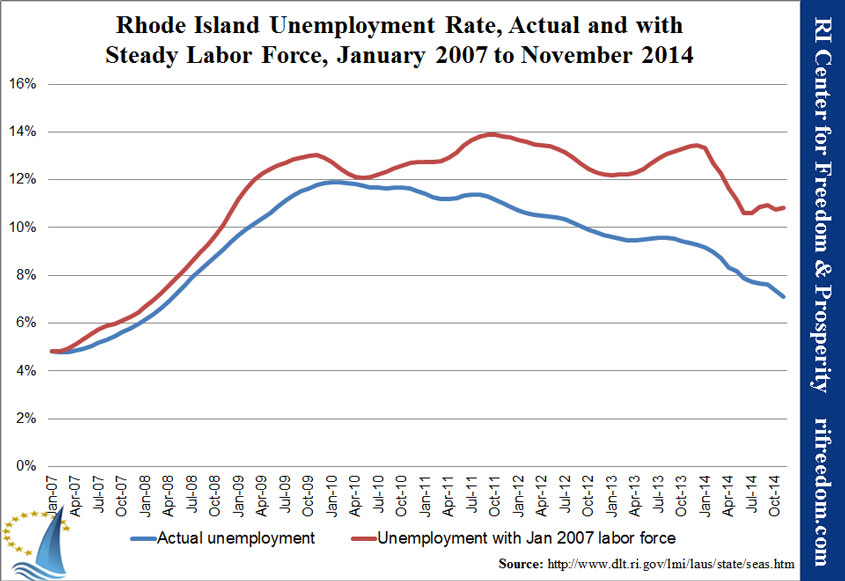
OFFICIAL STATEMENT: December 11, 2014 (2:30 PM)
Council Moves Controversial Plan Forward Despite Overwhelming Public Opposition
Unanimous Vote Indicates RhodeMap RI was pre-Ordained Insider Deal
Providence, RI – “Today we saw the danger of un-elected bureaucrats, accountable to no one, becoming involved in major public policy decisions,” said Mike Stenhouse, CEO for the Rhode Island Center for Freedom & Prosperity, following the state Planning Council’s unanimous vote to adopt the controversial RhodeMap RI plan. “It’s like the public was not even there; not one of the concerns expressed was even acknowledged, let alone addressed by the council. This plan was obviously an insider deal, pre-ordained to be adopted.”
About 100 people attended the Center’s press conference and rally prior to the planning council meeting, while a standing-room-only crowd of over 200 people were in attendance at the meeting. Another 50 people or so were turned away from the meeting because of fire-code capacity restrictions.
As evidence of the insider game, the Center today discovered that GrowSmart RI, the local urban redevelopment advocacy group that served as the primary architect of the RhodeMap RI plan, has been funded in large part over recent years by both the state of Rhode Island and the RI Foundation, each of which has been strongly supportive of the so-called economic development plan.
“It’s ironic that while diversity and inclusion has been the clarion call of RhodeMap RI supporters, it is disturbing to see the lack of thought-diversity among both the consortium and planning council members that created and advanced this plan; with virtually no representation from the private sector, from the center-right, from taxpayers, or from true economic development experts – and was almost exclusively comprised of government insiders and left-wing special interest advocates,” continued Stenhouse. “This is not healthy. The more we learn about this plan, the more it reeks of 38-Studios style cronyism.”
The primary argument expressed by most of those who spoke in opposition to the plan today was that the General Assembly, the duly elected representatives of the people, should be the body that should advance any economic development plan, not un-elected appointed insiders, beholden to a government-centric agenda.
*****
MEDIA ALERT
December 11, 2014 (6:00 AM)
Press Conference & Major Protest Rally Planned Prior to RhodeMap RI Vote This Morning
Statement from Westchester County Executive. Dozens of legislators, governmental entities, advocacy orgs, and taxpayer groups to be represented.
Providence, RI – Following the adoption last evening of the seventh municipality to recommend that the RhodeMap RI process be halted, the Rhode Island Center for Freedom & Prosperity will hold a press conference and protest rally at 8:30 AM this morning, immediately preceding the scheduled state Planning Council vote to adopt the controversial RI plan into the state’s official Guide Plan.
The Center is working alongside the recently formed citizens group, PRARI, to organize the rally, which will include individuals and organizations that oppose the plan. The group will then proceed into the planning council meeting, where public comments are scheduled to be heard from attendees.
It is the position of the Center that adoption of RhodeMap RI will lead to intrusive interference from the federal government. “Washington bureaucrats, who you will never see or meet, want the power to determine who will live where and how each neighborhood will look, said Rob Astorino, Commissioner of Westchester County, NY, who has been battling HUD mandates for years. “What’s at stake is the fundamental right of our cities, towns, and villages to plan and zone for themselves. HUD thinks it can trample on Westchester because it has the misguided notion that zoning and discrimination are the same thing. They are not.” According to Astorino, HUD has categorized Westchester as a “grand experiment”, which the Center does not want to see in Rhode Island.
The rally is expected to attract well-over 100 people – from state and local lawmakers, city and town councils, as well as various taxpayer groups, advocacy organizations, and other concerned Rhode Island residents – who are seeking to stop the RhodeMap RI plan.
Representatives from dozens of state and local groups as well as multiple elected officials are also expected to attend. Among the notable individuals and organizations in opposition to RhodeMap RI, are:
Eight Towns passed resolutions calling for a halt to the process:
Town of Scituate:
Town of Portsmouth
Town of Foster
Town of Tiverton
Town of East Greenwich
Town of W. Greenwich
Town of Hopkinton
Town of Exeter
State & Municipal Legislators:
Mayor Allan Fung
Sen. Lou Raptakis
Sen. Nick Kettle
Sen. Mark Cote
Rep. Mike Chippendale
Rep. Doreen Costa
Rep Patricia Morgan
Rep. Anthony Giarrusso
Sen-elect Mark Gee
Sen-elect Elaine Morgan
Rep-elect Dan Reilly
Rep. elect Sherry Roberts
Rep- elect Bob Nardolillo
Rep-elect Justin Price
Rep-elect Robert Lancia
Formal/State ORGS:
RI Center for Freedom & Prosperity
RI Farm Bureau
RI Tea Party
RI Taxpayers Association
OSTPA
Libertarian Party of RI
Federated RI Sportsmen Club
Manville Sportsman’s Rod & Gun Club
Stephen Hopkins Center for Civil Rights
Alliance for Safe Communities
Citizen/Local GROUPS:
PRARI
CITIZENS Against RhodeMap RI
Bristol Taxpayers Association
East Bay Patriots
NK Republican Committee
Ayn Rand Admirers of RI
Portsmouth Concerned Citizens
North Kingstown Taxpayers Association
Northwest RI Tea Party
Former US Representative Candidates Rhue Reis and Mark Zaccaria
For more information, the Center’s home-page for RhodeMap RI is: www.RIFreedom.org/PropertyRights.
THE PRESS CONFERENCE & RALLY:
WHEN: Thursday, December 11, 2014, Press Conf & Rally at 8:30 AM; public meeting at 9:00 AM
WHERE:William E Powers Building, Dep’t of Administration, Capitol Hill, Providence
WHO: Mike Stenhouse, Representative Mike Chippendale
About PRARI: The Property Rights Alliance of RI is a citizens group dedicated to informing the public about the dangers of RhodeMap RI.










